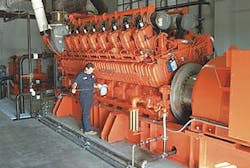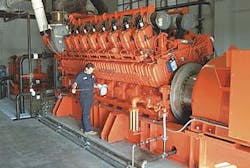Engine/Generator Sets Provide Power, Heat for Use by Two Tampa Utilities
By Brian Haggerty
It isn't often when one solution can meet the needs of two separate entities, but this is exactly what happened for two utilities in the City of Tampa, FL. Tampa Electric, the local power company, needed to add extra generating power to its grid. Meanwhile, the city's wastewater treatment plant needed to increase available emergency backup power, plus it wanted to improve the efficiency of its gas-fired drum dryers at the sludge-drying facility.
In a cooperation agreement between the City of Tampa and Tampa Electric (TECO), a pair of Waukesha Engine Enginator" natural-gas engine/generator units using cogeneration was the solution to all three needs. The natural gas engine generator sets will produce electricity and provide process heat from the exhaust, thereby saving money for both the utility and the city. In addition, the units will serve the modern, 96 mgd Howard F. Curren Advanced Wastewater Treatment Plant with emergency standby power.
According to John Kelly, the project manager for Tampa Electric, the use of natural gas engines made sense for a lot of reasons.
"The fact that the exhaust heat from the engines is being captured and used in the sludge drying operation means that every time natural gas prices rise, the project will make even more sense economically," he said.
The Tampa project is the first time Waukesha 16VATGL 16-cylinder, 900 rpm engines have been used for power generation in the U.S. The two engines provide 2.9-MW each and are scheduled to produce power during peak periods, from 9 a.m. to 10 p.m., Monday through Friday, to serve the summer demand and other peak use times. This is enough electricity to power roughly 1,200 homes.
The $6 million total initial cost for the project is expected to be paid back over the 15-year contract the utility has with the city to provide the cogeneration.
While TECO will operate the Enginators for producing grid connected electric power, the engines' 700° exhaust heat will be used by the city to displace heat that is currently produced from natural gas combustion in the existing sludge drying facility. The engines will operate in the combined-cycle (electricity and heat) mode during weekdays when the sludge-drying process is in operation, and in a single-cycle mode on weekends. The heat will be used in turning-drums for drying sludge produced in the wastewater treatment process. The dried sludge will be pelletized and sold by the city for use in fertilizer products.
"The most significant challenge we experienced throughout this process was applying for and receiving the air construction permit from the Florida Department of Environmental Protection," said project coordinator, Anthony Pasley. The City of Tampa applied for the permit, which required, among other things, the submission of unit specifications, emission rates, projected hours of operation, and a rigorous multisource computer modeling analysis demonstrating that the operation of the two units would not result in an adverse environmental impact. WW/
About the Author: Brian Haggerty is the Eastern Regional Manager, Power Generation Sales, for Waukesha Engine, Dresser, Inc. He will be a presenter at the upcoming Power-Gen International Exhibition, Dec. 12-14, in Las Vegas and will discuss the Tampa cogeneration application.

